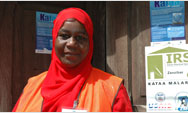Youth Profiles: Esther – Kampala, Uganda
“My family’s tribe originated on an island, so we were aware of water problems they encountered, which included issues with fish, and other things. Parts of my family grew coffee and raised cattle.”
Esther is 26 years old, currently living and working in Washington, D.C. She was born in Kampala, Uganda, and has lived in Kenya, the United Kingdom, as well as the U.S. She has four sisters. Two of her sisters are still living in Uganda, the other two are in Afghanistan and London. Her father is currently a politician and her mother runs her own business. They both live in Kampala, Uganda.
As a girl, Esther attended a private, Protestant, all-girls boarding school about 30 minutes outside of Kampala. “We woke up every morning at 6:00 am to drumbeats outside the church on the grounds and everyone was assigned to various ‘housework teams’, which included such subjects as farming, dining hall, classroom, or taking care of the school grounds. My first year in school I was assigned to dining hall, where I had to peel potatoes, cassava, etc.”
Esther remembers her daily routines in detail. “Our bathroom was communal and we did not always have running water and electricity, so many times our baths were cold. Breakfast was served between 7:30 and 8:00 am, and a typical meal consisted of milk tea, porridge, and some sort of snack. After breakfast we would line up in front of the church for morning assembly, which included a roll-call, daily hymn, prayer, and sometimes speeches by the head mistress. In the afternoon after classes, we had free time, which we spent washing our clothes (by hand) or doing other personal chores. After dinner we had about 1.5 hours of prep (like homework in this country) where we would return to classrooms to complete our homework assignments. After that we returned to our dorms, and if electricity was available we would read until lights were turned off. We had to bring everything ourselves, such as roll-up mattresses and jerry cans to store water.”
Breakfast was a lot like what U.S. students may eat. “Some typical dishes were boiled kidney beans with onions, ‘Ugali’ which is a thick maize meal, ‘Katogo’ which is a mixture of cassava and beans, ‘Matooke’ which is a type of banana mashed served with beans or peas, and a luxury meal would consist of ’Matooke’ with chicken stew. We also ate various roots, such as sweet potato and cassava. We also had a small kiosk on the ground where we could purchase cookies, fruits and other snacks, depending on how much a student could afford.”
Esther has fairly recently come to understand the importance of the environment and how it can impact life. “My family’s tribe originated on an island, so we were aware of water problems they encountered, which included issues with fish, and other things.
Parts of my family grew coffee and raised cattle. My mother used to grow fresh vegetables in the backyard. I was aware of air pollution because the air in Kampala was quite dusty. I also remember politicians arguing for preservation of forests and national parks, especially after the war. Much of the land was privatized and the government was looking for some sort of regulation.”
Like many American youngsters, Esther was more aware of other kinds of problems in the world. Unlike us, however, her awareness hinged on life and death issues. “We moved back to Uganda after the civil war. My family had to leave because our lives could have potentially been in danger. Many friends told us stories of soldiers approaching their homes, machine-gun fights, that sort of thing.”
Esther wants to use her experiences and her education helping others in the field of public health. “I grew up in a typical African household,” Esther explains, “where parents want their children to be doctors, lawyers, or other professions along these lines. My parents wanted me to become a doctor. I came to the U.S., where I had to get a B.A. before applying for medical school. I was majoring in biology and psychology and during my senior took a class in public health, which sparked my interest in the field. I am very interested in community development. More specifically, I am interested in Malaria prevention programs.”
|


